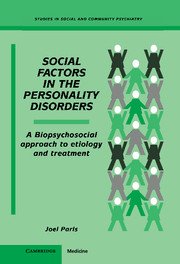Book contents
- Frontmatter
- Contents
- Foreword
- Introduction
- Acknowledgments
- 1 Overview
- 2 Personality Traits and Personality Disorders
- 3 Biological Factors
- 4 Psychological Factors
- 5 Social Factors – Methods
- 6 Social Factors – Mechanisms
- 7 A Biopsychosocial Model of the Personality Disorders
- 8 The Odd Cluster
- 9 The Impulsive Cluster
- 10 The Anxious Cluster
- 11 Treatment
- 12 Clinical Practice
- Epilogue: Summary and Research Implications
- References
- Index
8 - The Odd Cluster
Published online by Cambridge University Press: 05 May 2010
- Frontmatter
- Contents
- Foreword
- Introduction
- Acknowledgments
- 1 Overview
- 2 Personality Traits and Personality Disorders
- 3 Biological Factors
- 4 Psychological Factors
- 5 Social Factors – Methods
- 6 Social Factors – Mechanisms
- 7 A Biopsychosocial Model of the Personality Disorders
- 8 The Odd Cluster
- 9 The Impulsive Cluster
- 10 The Anxious Cluster
- 11 Treatment
- 12 Clinical Practice
- Epilogue: Summary and Research Implications
- References
- Index
Summary
The previous chapter has proposed a general theory to account for the common factors in the development of any personality disorder, using a model that considers interactions of biological, psychological, and social factors. However, the risks for one type of disorder may not apply to another. We therefore need to examine each diagnostic category separately. Since some disorders have been researched extensively, while others have not been examined in any systematic way, we will allot more space to those about which some degree of empirical data is available.
As reviewed in Chapter 1, the categories of personality disorder described in DSM and ICD-10 have uncertain validity. They overlap with each other, probably due to shared personality dimensions. For this reason, it will be useful to consider them in groups. The next three chapters will review specific categories within the three clusters of disorders described by Axis II of DSM. In addition, we will examine each category separately, in relation to phenomenology, etiology, outcome, and treatment.
Phenomenology of the odd cluster disorders
The personality disorders in the A cluster (schizotypal, schizoid, and paranoid) are associated with unusual thoughts and behaviors, as well as with an inability to establish meaningful interpersonal relationships.
Schizotypal personality disorder
Both DSM and ICD describe a schizotypal disorder, characterized by eccentricity, social deficits, and cognitive distortions. The DSM diagnosis of schizotypal personality disorder requires at least five of the following criteria: ideas of reference, odd beliefs or magical thinking, unusual perceptual experiences, odd thinking and speech, suspiciousness or paranoid ideation, inappropriate or constricted affect, eccentric behavior, lack of close friends, and excessive social anxiety.
- Type
- Chapter
- Information
- Social Factors in the Personality DisordersA Biopsychosocial Approach to Etiology and Treatment, pp. 102 - 109Publisher: Cambridge University PressPrint publication year: 1996



